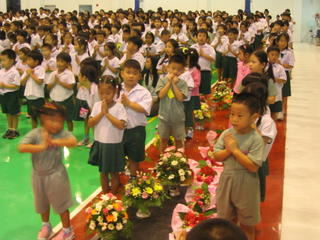Wai Kru = Respect for Teacher Day!
 On Wednesday, September 28, the Thai and Chinese Departments welcomed all TCIS staff to participate in the Wai Kru (literally, Respect Teacher) ceremony. The ceremony is a combination of Thai Wai Kru and Chinese Teachers day.
On Wednesday, September 28, the Thai and Chinese Departments welcomed all TCIS staff to participate in the Wai Kru (literally, Respect Teacher) ceremony. The ceremony is a combination of Thai Wai Kru and Chinese Teachers day.The following was emailed to all teachers from the Thai and Chinese departments regarding the Wai Kru ceremony:
This activity is an essential activity for students in Thailand. The ceremony has a meaningful thought and value to students and teachers. ”Paying respect to the teachers” are the words that would best describe “Wai Kru”.
Before the ceremony day, students spend time preparing and practicing the Wai Kru chant for performing in the ceremony as paying respect to their teachers. They also provide flower and candle trays. These two things represent respect and gratitude. Each of the materials used to make the trays have a meaning related to academics. For example, the “Dok Kem” (needle flower) represents having sharp brain. ”Ya Praek” (Bermuda grass) represents humility and growth as the spread of knowledge. Aside from these two, there are other kinds of flower on it too, that symbolize the other ideas. All of our students will create to do the best for all teachers. The ceremony is formal, during the ceremony students will sit on the floor while teachers are on the chair, so please dress up in an appropriate outfit and avoid putting up or crossing your leg.
Chinese “Teacher’s Day”
Since 1939, the Teacher Appreciation day of R.O.C. sits on Confucius’ birthday. Teachers' Day is not only meant to commemorate Confucius but also to honor and pay respect to our own teachers.
The annual Confucius Birthday Ceremony, held each year in the early morning hours of September 28, is a solemn affair to honor one of the most revered figures in Chinese history. The ceremony included rituals, sacrifice offerings, traditional music, dance and apparel. It was meant to pay tribute to Confucius who made lasting contributions to Chinese and neighboring countries’ education. Confucius was born in 551 B.C. and died in 479 B.C. These concepts have been imbibed by the Chinese for thousands of years and prevail to this day. Also, he continued to influence Chinese with Confucianism (儒教), which has infused Chinese customs and values. Besides its influence on public affairs, Confucianism also influences routines of daily life—it teaches us how to become people of noble character and integrity. To honor such a great man and the contribution he has made, every September 28th marks a national holiday. During the celebrations, respect, solemnity, a sense of order and dignity were apparent at the ceremony in accordance with the spirit of the Confucianism.
The ceremony culminates with the distribution of wisdom rice cakes (智慧毛). In the past, it was the distribution of wisdom hair, from the forehead of calves. Many students are interested in the "pulling out the hair of cattle" rite. According to tradition, the hair of cattle represents wisdom and the hair will bless people by helping them pass exams or get good grades. However, as it is not human hair, wisdom rice cake is used instead. The activity is still quite popular among citizens. It is believed that those who obtain wisdom rice cake will grow in wisdom.